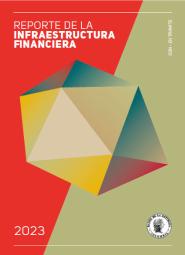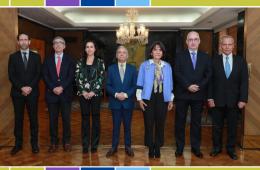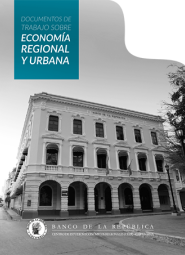Banrep minutes: The Board of Directors of Banco de la República unanimously voted to maintain the monetary policy rate unchanged at 13.25%
- Annual consumer price inflation decreased in May for the second consecutive month to 12.4%, fronted by a reduction in the annual food price inflation rate from 27.8% in December 2022 to 15.7% in May 2023. In contrast, increases were observed in the inflation of regulated items resulting from heightened gasoline prices, as well as the inflation rate of services. The core inflation rate excluding food and regulated items remained stable at around 10.5% and, like headline inflation, is still significantly distant from the established target of 3.0%.
- The survey of economic analysts results for May showed that, according to the sample median, their inflation expectations for the 12- and 24-month forward horizon continue to decline and currently stand at 6.4% and 4.0%, respectively; for yearend 2024 median expectations of the sample remained at 5.0%. Furthermore, inflation expectations derived from the government debt securities (TES) market for the one- and five-year-ahead horizons, controlling for liquidity risks and inflation premium, stand at between 4.8% and 6.4% respectively.
- During the first quarter of 2023, GDP registered an annual growth of 3.0%, a year-on-year decrease versus the same quarter of the previous year (8.1%), as a result of a slowdown in consumption and contraction of gross capital formation. Economic activity continued to decelerate in April, as observed in the Economic Monitor Indicator (ISE), which exhibited a -0.8% drop during this period. Despite the observed deceleration, according to the National Administrative Department of Statistics’ (DANE) May report, there was no impairment in the labor market indicators, and rather the upward trend in the employed population and decline in the national aggregate unemployment rate continued. A slowdown in domestic demand has led to a significant correction of the country's external imbalance, with the current account deficit narrowing to 4.2% of GDP in the first quarter of 2023, versus a deficit of 6.2% in 2022.
- To date this year, the Colombian peso has presented a considerable appreciation against the US dollar of 13%, while risk premiums for Colombia have decreased substantially, partially reversing the relative deterioration observed in the previous two years in comparison to other emerging economies. This has occurred against a backdrop of high global economic uncertainty and lower international oil prices, from an average benchmark price of close to USD 100 per barrel in 2022 to prices currently fluctuating below USD 80 per barrel.
The Directors noted that annual headline inflation, after stabilizing at a figure slightly above 13% during the first quarter, registered successive decreases in April and May due to the decrease in food inflation; downward adjustments in the international price of some food and transportation costs; the revaluation of the country’s exchange rate; and the decline in producer price inflation, among other factors. The above within an environment of moderated growth of domestic demand and a contractionary monetary policy interest rate. At the same time, they stressed that there are risks ahead underlying the behavior of inflation that cannot be overlooked, such as the El Niño weather phenomenon, the anticipated increases in domestic fuel prices, and the uncertainty surrounding the international economic state of affairs. Under these circumstances, they unanimously supported the decision to leave the intervention interest rate unchanged and warned that conditions were not yet suitable to relax its contractionary monetary policy stance. In their interventions, the Directors expounded on the grounds for their decision and the need to maintain a cautious approach to monetary policy management.
The Board of Directors of Banco de la República highlighted the decrease of headline inflation by close to one percentage point between March and May. They noted the slowdown in the rise of core inflation and the reduction seen in inflation expectations as the peso appreciated, despite increases in gasoline prices that exert upward pressure on the regulated items component of the consumer basket. They added that the cumulative 11.5 percentage points increase in the policy interest rate is already evident in a cooling growth rate of aggregate demand, as seen in the first quarter GDP results and the ISE for April. They remarked that the downward adjustment in domestic demand, surpassing that seen for GDP, has admitted a reduction of the current account deficit. They also noted a less dynamic consumer credit, from increasing at annual rates reaching 23% in the third quarter of 2022 to more moderate annual growth of less than 7% by mid-June, and 0% if the variation is measured for the last thirteen weeks. The lower consumer credit activity lessens the probability of household over-indebtedness. Finally, the Directors acknowledged the government's advances in reducing the fiscal imbalance through the last two tax reforms, and their determination to undertake the necessary fuel price adjustments.
While acknowledging progress, the Directors underscored several risks that could affect the future behavior of inflation that require special caution in the formulation of forthcoming monetary policy decisions to avoid delaying its convergence to the 3.0 target. Consequently, they pointed out that, despite the recent reduction in inflation, the latter continues to register a significantly high level, in contrast with the substantial inflation reductions recently experienced in advanced countries and comparable Latin American economies. They added that core inflation without food or regulated items, particularly the services component, has shown a marked rigidity, demonstrating that, except for food, significant inflationary pressures persist. In this regard, they warned that expectations for both headline inflation and inflation excluding food continue high and above the target at several terms, despite their recent decreases. In addition, the Directors pointed to specific risks that introduce significant uncertainty regarding future inflation behavior. These include potential effects of the El Niño weather phenomenon on food and energy prices, and high global uncertainty. They stressed that risk scenarios subsist that require leaving room for a possible monetary policy response in the direction which the Board of Directors of Banco de la República considers necessary.
Finally, the Directors emphasize that the decision adopted in today’s meeting is compatible with its objective of bringing inflation to its 3% target. Future decisions by the Board will be determined according to new information available.




















































